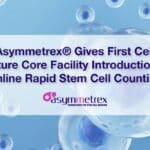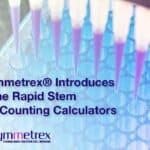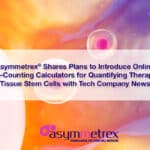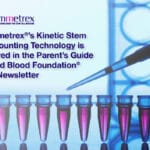Since September 2018, Massachusetts stem cell biotechnology company Asymmetrex has been pursuing a campaign to increase awareness of the adult tissue stem cell counting problem in stem cell medicine and the stem cell supply industry. The latest 2018 installment in this effort is a book chapter, authored by Asymmetrex’s founder and director, that illuminates why a means to count the number of stem cells in stem cell treatments is crucial for progress in stem cell medicine.
When Dr. James L. Sherley, M.D., Ph.D., founder and director of Massachusetts stem cell biotechnology company Asymmetrex, was invited to contribute a chapter to the new book Perinatal Stem Cells: Research and Therapy, he knew immediately what his topic would be. “I wanted to continue Asymmetrex’s effort to address a debilitating secret of stem cell medicine. For more than a half-century, stem cell medicine has tried to advance without knowing the dose of stem cells in stem cell treatments.”
Although it is inconceivable that patients in any other medical setting would be administered drugs or medicines without knowing their dose – number of drug molecules, weight of medicines – this otherwise unacceptable practice is usual for stem cell treatments. Whether they are approved treatments like bone marrow and cord blood transplants, or new treatments evaluated in clinical trials, or controversial treatments offered in private stem cell clinics, in all cases, the dose of stem cells administered to patients is unknown.
The tissue stem cell dose problem is not limited to clinical applications either. Upstream of medical and clinical uses, stem cell preparations are also supplied without knowing the number of stem cells contained in them.
In the recently published book chapter, “Dose Determination for Stem Cell Medicine: A Need Whose Time Has Come,” Sherley discusses why this situation exists and persists. He describes “pseudo-dosing” as the practical response by the field of stem cell medicine and the stem cell supply industry to the previously unsolvable problem of counting therapeutic tissue stem cells specifically and accurately.
Pseudo-dosing comes in many forms, but the most common is due to tests that do not count tissue stem cells specifically. Existing widely-used, but misnamed, “stem cell biomarkers,” “stem cell assays”, and even “stem cell counts” have contributed to the surprisingly commonly-held misconception that therapeutic stem cell counting and dose determination occurs routinely as for other medical treatments. Sherley’s chapter emphasizes that nothing could be farther from the truth, and goes on to outline the tremendous losses in treatment quality and stem cell medical progress caused by this remarkable misunderstanding.
Education to correct the misconception that stem cell counting and stem cell dosing have been in place all along can improve progress in stem cell medicine. However, Sherley points out that education about emerging new technologies for specific counting of tissue stem cells would have an even greater impact. The chapter also describes novel strategies for discovery of specific stem cell biomarkers and Asymmetrex’s recent development of a computational method for counting adult tissue stem cells for the first time. Director Sherley and his AlphaSTEM Test™ team anticipate that instilling a better understanding of the long-standing stem cell counting and dosing problem will motivate more rapid evaluation and adoption of the long-needed, if not necessarily long-awaited, solution.
Asymmetrex, LLC is a Massachusetts life sciences company with a focus on developing technologies to advance stem cell medicine. Asymmetrex’s founder and director, James L. Sherley, M.D., Ph.D. is an internationally recognized expert on the unique properties of adult tissue stem cells. The company’s patent portfolio contains biotechnologies that solve the two main technical problems – production and quantification – that have stood in the way of successful commercialization of human adult tissue stem cells for regenerative medicine and drug development. In addition, the portfolio includes novel technologies for isolating cancer stem cells and producing induced pluripotent stem cells for disease research purposes. Asymmetrex markets the first technology for determination of the dose and quality of tissue stem cell preparations (the “AlphaSTEM Test™”) for use in stem cell transplantation therapies and pre-clinical drug evaluations.







Leave a Reply